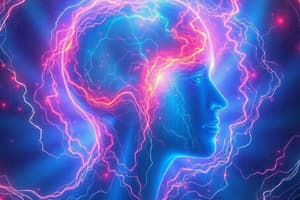Podcast
Questions and Answers
What is learning?
What is learning?
Permanent change, experience
Behavior is a function of its?
Behavior is a function of its?
Environment and consequences
What does conditioning refer to?
What does conditioning refer to?
Stimuli and responses
What are the three types of learning?
What are the three types of learning?
What is classical conditioning?
What is classical conditioning?
Who discovered classical conditioning?
Who discovered classical conditioning?
What does Pavlov's Dog refer to?
What does Pavlov's Dog refer to?
What is an unconditioned stimulus?
What is an unconditioned stimulus?
What is an unconditioned response?
What is an unconditioned response?
Give an example of an unconditioned stimulus.
Give an example of an unconditioned stimulus.
Give an example of an unconditioned response.
Give an example of an unconditioned response.
What is a conditioned stimulus?
What is a conditioned stimulus?
Give an example of a conditioned stimulus.
Give an example of a conditioned stimulus.
What is a neutral stimulus?
What is a neutral stimulus?
What is a conditioned response?
What is a conditioned response?
Who is Edwin B. Twitmeyer?
Who is Edwin B. Twitmeyer?
What was the apparatus experience conducted by Twitmeyer?
What was the apparatus experience conducted by Twitmeyer?
What is the unconditioned stimulus of the apparatus experience?
What is the unconditioned stimulus of the apparatus experience?
What is the conditioned stimulus of the apparatus experience?
What is the conditioned stimulus of the apparatus experience?
What does John Watson's Little Albert experiment aim to determine?
What does John Watson's Little Albert experiment aim to determine?
What is acquisition in classical conditioning?
What is acquisition in classical conditioning?
What is extinction in classical conditioning?
What is extinction in classical conditioning?
What is spontaneous recovery?
What is spontaneous recovery?
What is the UCS in dental anxiety?
What is the UCS in dental anxiety?
What is the CS in dental anxiety?
What is the CS in dental anxiety?
How is classical conditioning applied in therapy?
How is classical conditioning applied in therapy?
What is graded exposure in vivo?
What is graded exposure in vivo?
What is a phobia in terms of classical conditioning?
What is a phobia in terms of classical conditioning?
What is fear in terms of classical conditioning?
What is fear in terms of classical conditioning?
What is a stimulus hierarchy?
What is a stimulus hierarchy?
What is counterconditioning?
What is counterconditioning?
What is one-session treatment?
What is one-session treatment?
Who is Martin Seligman?
Who is Martin Seligman?
What is the UCS in the Seligman incident?
What is the UCS in the Seligman incident?
What is the UCR in the Seligman incident?
What is the UCR in the Seligman incident?
What is the CS in the Seligman incident?
What is the CS in the Seligman incident?
Flashcards are hidden until you start studying
Study Notes
Learning and Conditioning Concepts
- Learning: Permanent change in behavior resulting from experience.
- Behavior and Environment: Behavior functions based on the environment and its consequences.
- Conditioning: Involves the association between stimuli and responses.
- Types of Learning: Includes Classical Conditioning, Operant Conditioning, and Vicarious Conditioning.
Classical Conditioning
- Definition: A learning process conceptualized by Pavlov, where two stimuli are repeatedly paired; a response conditioned by the second stimulus will eventually occur with the first stimulus alone.
- Ivan Pavlov: Noted psychologist who discovered classical conditioning through experiments with dogs, teaching them to salivate at the sound of a bell (Pavlov's Dog).
Key Terminology
- Unconditioned Stimulus (UCS): A stimulus that naturally triggers a response without prior learning (e.g., food, loud noise).
- Unconditioned Response (UCR): The unlearned, reflexive response to an unconditioned stimulus (e.g., salivation).
- Conditioned Stimulus (CS): A previously neutral stimulus that, after conditioning, elicits a conditioned response.
- Conditioned Response (CR): A learned response to a conditioned stimulus.
Important Experiments
- Pavlov's Dog Experiment: Demonstrated classical conditioning by pairing food with the sound of a bell, leading to salivation upon hearing the bell alone.
- Edwin B. Twitmeyer: A pioneer of classical conditioning who conducted an experiment using a hammer hitting the knee, which paired a bell with the reflexive knee jerk response.
- Watson and Little Albert Experiment (1919): Explored fear as a conditioned response; conditioned a child to fear a white rat by associating it with loud, frightening noises.
Conditioning Processes
- Acquisition: Learning occurs through trials consisting of pairings of the conditioned stimulus and unconditioned stimulus.
- Extinction: The reduction of a conditioned response when the unconditioned stimulus no longer follows the conditioned stimulus.
- Spontaneous Recovery: The reappearance of a previously extinguished conditioned response after a period of rest.
Applications of Classical Conditioning
- Dental Anxiety:
- UCS: Pain from a dental drill.
- CS: The sight of the drill; leads to a conditioned fear response.
- Treatment Approaches:
- Graded Exposure in Vivo: Gradual exposure therapy for phobias.
- Stimulus Hierarchy: A ranked list of anxiety-inducing stimuli from least to most threatening.
Advanced Concepts
- Counterconditioning: A therapeutic technique that involves exposing individuals to feared stimuli within a controlled hierarchy to replace fear responses.
- One-Session Treatment: A rapid exposure method that takes a few hours for effective desensitization without relaxation procedures.
- Martin Seligman Incident: Illustrates prepared learning through an association formed between a food (A1 sauce) and illness, leading to aversion.
Summary of Associations
- Seligman Incident:
- UCS: Flu virus.
- UCR: Nausea.
- CS: A1 sauce.
- CR: Aversion to the sauce due to the association with discomfort.
Studying That Suits You
Use AI to generate personalized quizzes and flashcards to suit your learning preferences.




